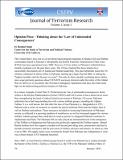Files in this item
Thinking about the 'law of unintended consequences'
Item metadata
| dc.contributor.author | Singh, Rashmi | |
| dc.date.accessioned | 2014-10-29T16:30:44Z | |
| dc.date.available | 2014-10-29T16:30:44Z | |
| dc.date.issued | 2010-10-13 | |
| dc.identifier.citation | Singh, R. (2010). Thinking about the 'law of unintended consequences'. Journal of Terrorism Research, 1(1), pp. 70-73. | en_US |
| dc.identifier.issn | 2049-7040 | en_US |
| dc.identifier.uri | http://ojs.st-andrews.ac.uk/index.php/jtr/article/view/168 | en_US |
| dc.identifier.uri | https://hdl.handle.net/10023/5609 | |
| dc.description.abstract | The United State’s now-not-so-covert drone based program targeting Al Qaeda (AQ) and Taliban commanders based in Pakistan’s inhospitable and hostile Federally Administered Tribal Areas (FETA) has been operational since 2004. However, US air strikes in Pakistan’s tribal belt have steadily escalated over the past three years. The US has claimed that these attacks have successfully decimated core Al Qaeda and Taliban leadership. This past September alone the US military conducted 26 drone strikes in Pakistan, racking up a figure that the BBC is calling the "highest monthly total for the past six years". Not only do these steadily escalating drone strikes raise some pertinent questions about US/NATO successes claimed under the rubric of the Global War on Terror (or if you prefer, the Overseas Contingency Operations) but they also shed some light on the deteriorating political situation in Pakistan. | en_US |
| dc.language.iso | en | en_US |
| dc.publisher | Centre for the Study of Terrorism and Political Violence, University of St Andrews | en_US |
| dc.relation.ispartof | Journal of Terrorism Research | en_US |
| dc.rights | This is an open access article published in Journal of Terrorism Research. This work is licensed under a Creative Commons Attribution 3.0 License (http://creativecommons.org/licenses/by/3.0/) | en_US |
| dc.rights.uri | http://creativecommons.org/licenses/by/3.0/ | |
| dc.subject | Al-Qaeda | en_US |
| dc.subject | Pakistan | en_US |
| dc.subject.lcc | HV6431 | en_US |
| dc.subject.lcsh | Terrorism | en_US |
| dc.title | Thinking about the 'law of unintended consequences' | en_US |
| dc.type | Journal item | en_US |
| dc.description.version | https://doi.org/Publisher PDF | en_US |
| dc.publicationstatus | Published | en_US |
| dc.status | Peer reviewed | en_US |
| dc.identifier.doi | https://doi.org/http://doi.org/10.15664/jtr.168 | en |
This item appears in the following Collection(s)
Except where otherwise noted within the work, this item's licence for re-use is described as This is an open access article published in Journal of Terrorism Research. This work is licensed under a Creative Commons Attribution 3.0 License (http://creativecommons.org/licenses/by/3.0/)
Items in the St Andrews Research Repository are protected by copyright, with all rights reserved, unless otherwise indicated.


